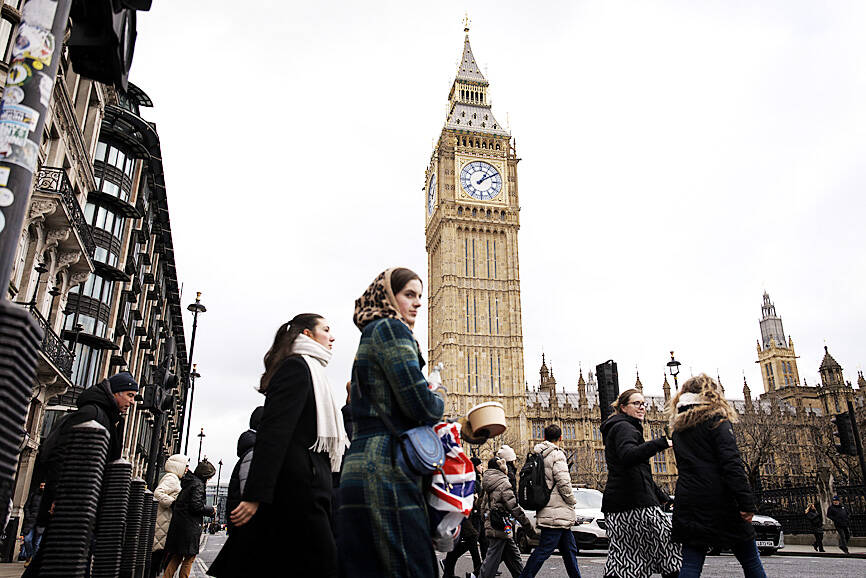More job cuts loom in UK as COVID-19 cash shrinks – Taipei Times

REDUCED HEADCOUNT:
Private-sector employers have shed more than 150,000 employees since last July, most of which were from the hospitality, retail and manufacturing
UK businesses have run down a mountain of cash reserves built up during the COVID-19 pandemic, leaving them more likely to cut jobs when the Labour Party’s tax hikes come into effect in April.
Firms added more than £150 billion (US$187.19 billion) to their savings when the economy was placed under COVID-19 restrictions, thanks to a mix of loans and large-scale public-sector support.
Corporate coffers reached almost double the value of their quarterly wage bills, a Bloomberg analysis of official data showed.
Photo: EPA-EFE
However, most of those excess reserves are now gone. Firms tapped into them during the cost-of-living crisis to keep up with inflation-busting pay rises, including double-digit increases in the minimum wage, and high borrowing costs.
The ratio of savings to payroll bills is now back to its pre-COVID-19 level of just above 1.5.
“It’s the corporate equivalent of households’ excess savings being eroded by high inflation last year,” EY ITEM Club chief economic adviser Matt Swannell said. “With some reserves, it’s easier to keep hold of staff even if they are expensive. In real terms though, if your savings have depleted, that becomes harder to do.”
Businesses complained vociferously after British Chancellor of the Exchequer Rachel Reeves increased a payroll tax by about £26 billion a year in her Oct. 30 budget. Reeves has insisted the tax rise would go ahead in April, blaming the previous Conservative government for leaving a £22 billion hole in the public finances.
Firms have already started to reduce headcount, as they brace not only for the hike in national insurance contributions, but also a third consecutive increase in the minimum wage that also takes effect in April.
The pace of job-cutting in January and December was the fastest since the wake of the 2008 global financial crisis, barring the COVID-19 pandemic, a purchasing-management survey published by S&P Global on Friday showed.
Supermarket giant J Sainsbury PLC a day earlier announced 3,000 roles are to go — including a 20 percent reduction in senior management — and that all of its remaining in-store cafes are to close.
HM Revenue & Customs data through last month showed that private-sector employers have shed more than 150,000 employees since Labour took office in July last year, including 70,000 since the budget. Workers in hospitality, retail and manufacturing have borne the brunt.
The run of bad economic headlines piles pressure on the Bank of England to cut interest rates further, with the post-COVID-19 trend of “hoarding” staff in the face of weak demand now apparently over.
Its newest rate-setter, Alan Taylor, recently warned of a “hard landing” and recession if officials act too slowly.
“There is scope for increased unemployment going forward,” Swannell said.
Related
Llyods Recruiting Engineers In India After Slashing Jobs In UK
Lloyds Banking Group is planning to hire hundreds of engineers in India as the company plans to shift its employment opportunit
Major new funding for music acts that supercharged careers of…
£1.6m Music Export Growth Scheme to support 58 independent UK artists to tour the world Funding will boost UK’s creative industries – a key growth se
Well-loved restaurant chain to close 8 venues across UK as…
A BELOVED restaurant chain has announced it will close eight venues across the UK, scrapping 158 jobs in the process.Owners are pointing the finger at Labour's
US adds 151,000 jobs in February as unemployment rate ticks…
The latest figures published by the US Bureau of Labor Statistics today (7 March) came in below market expectations, with economists polled by












